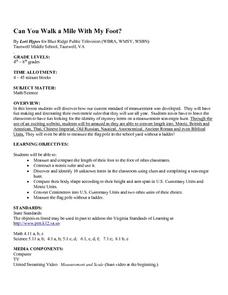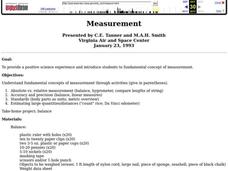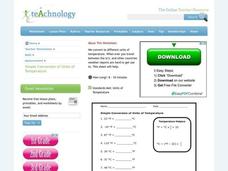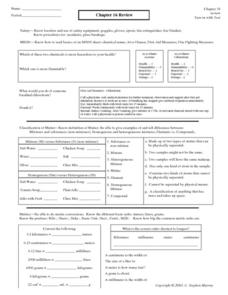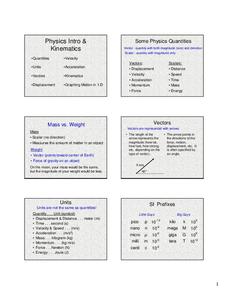Curated OER
How Long? How Wide?
Second graders distinguish between and use nonstandard and standard units of measurement, use appropriate tools and techniques to measure length and width, and record and interpret data using graphs.
Curated OER
Making It Balance
Students listen to story, "The 100-Pound Problem," compare their weight with character in story, and weigh different classroom items using nonstandard units and standard units. They experiment with different items that can make scale...
Curated OER
Weather Dot Com
Students examine the need for a standard unit of temperature and measure temperature with a thermometer. They discuss the details of a thermometer and the calibrations used, record temperature data for inside and outside, explore...
Michigan Sea Grant
Water Quantity
It may be tricky for a young mind to conceptualize that less than 1% of all water on earth is useable for humans to drink. Simulating the amount of fresh water available on earth by removing measured amounts of water from a five-gallon...
Curated OER
To an Inch and Beyond!
Third graders measure in multiples of inches. In this measurement lesson, 3rd graders employ a variety of strategies to measure several items in inches.
Curated OER
Can You Walk a Mile With My Foot?
Students engage in a lesson that is concerned with the measurement of a foot as a customary unit. They take part in a series of activities to help them acquire skills of using a foot to compare other units of measurement. The teacher...
Curated OER
Exploring Customary and Metric Systems
Students investigate and measure using the metric and customary units. In this math lesson, students investigate which method is used most worldwide, the metric or the customary. They convert from unit to the other.
Curated OER
Measurement
Students experience a positive science experiment and study fundamental concepts of measurement.
Curated OER
Boxing On
Students participate in five center activities in which they construct three dimensional objects using cubic centimeter manipulatives such as sugar cubes and toothpaste boxes. They determine the volume of the objects. They build a model...
Curated OER
The Royal Cubit
Students explore the history of measurement in ancient Egypt. In this math lesson, students discuss the development of a standardized measurement system. Students measure using various units and discuss the results and the need for a...
Curated OER
Commutative Property
First graders use various models to learn the Commutative Property of Addition. In this Commutative Property lesson, 1st graders use other students, counters, balances, and dominoes to apply the addition property. Students solve addition...
Curated OER
The Smallest Metric Measurements
In this metric measurement worksheet, students solve 15 problems in which three metric measurements in a series are analyzed. Students circle the smallest metric measurement in each problem.
Curated OER
Chapter 16 Review- General Science
In this review of general science worksheet, students classify examples of matter as mixtures or substances, homogeneous or heterogeneous mixtures, or elements or compounds. Students also convert several examples using the standard...
Curated OER
Estimation Task
Upper graders practice their estimation skills by observing different objects then making their best guess without using measuring instruments. Students are asked to estimate mass, length, volume, and area.
Curated OER
Height and Weight
Third graders explore their height and weight. They measure the heights and weights of their peers. Students record their data using an Excel spreadsheet. They create a graph to compare the data and analyze it for a correlation between...
Curated OER
Shoe Showdown
Third graders use rulers to measure their shoe size in inches and centimeters. They then enter the class shoe measurements into an excel data base and graph the results of both to make the comparison.
Curated OER
Unit 1 Matter and Energy
Topping this worksheet is a comprehensive collection of notes about phase changes. The phase change graph is displayed, along with formulas for the gas laws, and information relating energy to change of phase. After reviewing these...
Inside Mathematics
Swimming Pool
Swimming is more fun with quantities. The short assessment task encompasses finding the volume of a trapezoidal prism using an understanding of quantities. Individuals make a connection to the rate of which the pool is filled with a...
K12 Reader
The Metric System
How did the metric system come to be, and why does the US not use it very much? Your class can learn the answers to these questions with the reading passage included here and then respond to the five related questions.
Teach Engineering
Capillarity – Measuring Surface Tension
How do cohesion and adhesion work together? The third installment of a nine-part series teaches young scientists the difference between adhesion and cohesion. They also learn how cohesion and adhesion work together to cause capillary...
Urbana School District
Physics Intro, Kinematics, Graphing
Some consider physics the branch of science concerned with using long and complicated formulas to describe how a ball rolls. This presentation, while long, is not complicated, yet it covers rolling, falling, and more. It compares vectors...
Statistics Education Web
The United States of Obesity
Mississippi has both the highest obesity and poverty rate in the US. Does the rest of the data show a correlation between the poverty and obesity rate in a state? Learners tackle this question as they practice their skills of regression....
Lane Community College
Review Sheets: Introductory Physical Science
This hybrid worksheet connects mathematics to a science class. Learners practice solving problems that involve making a variety of conversions. An assortment of questions hits all the calculations needed for a middle school or beginning...
EngageNY
End-of-Module 3 Assessment Task
Let's see what the class learned! The last installment of the 23-part Pre-calculus module consists of nine assessment questions designed to measure a specific portion of a standard in the unit. Learners demonstrate their understanding of...







